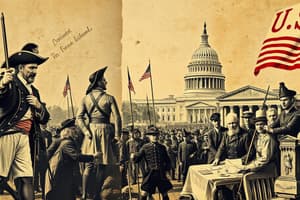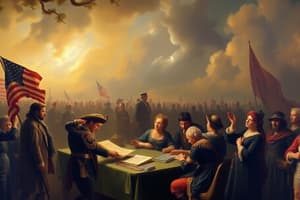Podcast
Questions and Answers
What was the primary consequence of the Boston Massacre?
What was the primary consequence of the Boston Massacre?
- It sparked the beginning of the Revolutionary War.
- It led to the immediate withdrawal of British troops.
- It resulted in the creation of the Declaration of Independence.
- It increased tensions between the colonists and the British Crown. (correct)
"No taxation without representation!" was a slogan used by the British Crown to justify taxation.
"No taxation without representation!" was a slogan used by the British Crown to justify taxation.
False (B)
What was the Articles of Confederation?
What was the Articles of Confederation?
The first constitution of the United States.
The ______ was a central document establishing the framework of the U.S. government in 1787.
The ______ was a central document establishing the framework of the U.S. government in 1787.
Match the following events with their significance:
Match the following events with their significance:
When were the Articles of Confederation ratified?
When were the Articles of Confederation ratified?
The Constitution was created primarily to provide a stronger federal government.
The Constitution was created primarily to provide a stronger federal government.
Why is the Declaration of Independence significant?
Why is the Declaration of Independence significant?
When was the Bill of Rights ratified?
When was the Bill of Rights ratified?
The Indian Removal Act was passed in 1803.
The Indian Removal Act was passed in 1803.
What is Manifest Destiny?
What is Manifest Destiny?
The __________ forced Native American tribes to relocate to present-day Oklahoma.
The __________ forced Native American tribes to relocate to present-day Oklahoma.
Match the following events with their corresponding years:
Match the following events with their corresponding years:
Which of the following illustrates the checks and balances system?
Which of the following illustrates the checks and balances system?
The cotton gin was invented in the late 18th century.
The cotton gin was invented in the late 18th century.
What triggered the secession of Southern states from the Union?
What triggered the secession of Southern states from the Union?
Flashcards
Bill of Rights
Bill of Rights
The first 10 amendments to the U.S. Constitution, guaranteeing fundamental rights and freedoms.
Checks and Balances
Checks and Balances
A system designed to prevent any one branch of government from becoming too powerful by giving each branch the ability to limit the power of the others.
Louisiana Purchase
Louisiana Purchase
The 1803 purchase of a vast territory from France, doubling the size of the United States and opening up westward expansion.
Manifest Destiny
Manifest Destiny
Signup and view all the flashcards
Indian Removal Act
Indian Removal Act
Signup and view all the flashcards
Cotton Gin
Cotton Gin
Signup and view all the flashcards
Abolitionism
Abolitionism
Signup and view all the flashcards
Secession
Secession
Signup and view all the flashcards
Boston Massacre
Boston Massacre
Signup and view all the flashcards
Articles of Confederation
Articles of Confederation
Signup and view all the flashcards
Constitution
Constitution
Signup and view all the flashcards
No Taxation without Representation
No Taxation without Representation
Signup and view all the flashcards
Declaration of Independence
Declaration of Independence
Signup and view all the flashcards
Early America's need for government protection of rights
Early America's need for government protection of rights
Signup and view all the flashcards
Study Notes
Unit 1: Colonization, Prerevolutionary Tensions, Revolutionary War
- Boston Massacre: A clash between British soldiers and American colonists in Boston, Massachusetts, in 1770; heightened tensions leading to the American Revolution.
- Declaration of Independence: Outlined "God-given rights" (life, liberty, and the pursuit of happiness) and listed grievances against British rule. The document formally declared the separation of the 13 colonies from Great Britain. It was written in response to a series of actions by Great Britain.
Unit 2: Constitution and Civics
- Articles of Confederation: The first constitution of the United States, enacted in 1781 during the Revolutionary War; created a weak central government, proved ineffective.
- Constitution: The supreme law of the United States; established a stronger federal government with three branches (legislative, executive, and judicial). Enacted in 1787.
- Bill of Rights: The first ten amendments to the Constitution; guarantee individual liberties (speech, religion, assembly, etc.) and protections against governmental intrusion. Established in 1791.
- Branches of Government: Legislative (Congress responsible for making laws), Executive (President enforces laws), and Judicial (Supreme Court interprets laws).
Unit 3: Early Republic Period and Westward Expansion
- Louisiana Purchase: Acquisition of a vast territory from France in 1803, doubling the size of the United States.
- Manifest Destiny: The belief that the United States was destined to expand across North America; often led to conflicts with Native American tribes.
- Indian Removal Act (1830): Forced relocation of Native American tribes from their ancestral lands to Indian Territory (present-day Oklahoma); caused significant suffering.
- Mexican-American War (1846-1848): War between the U.S. and Mexico resulting in territorial acquisition (California, Nevada, Utah, etc.).
Unit 4: Abolition and Civil War
- Cotton Gin: A machine that revolutionized cotton production, significantly increasing demand for enslaved labor, and strengthening the Southern economy and entrenching slavery. Invented in the late 18th century.
- Abolitionism: A movement to end slavery, prevalent in the early 19th century; challenged Southern economic systems and societal norms.
- Secession: The withdrawal of Southern states from the Union (1860-1861), leading to the American Civil War.
- Civil War: The bloodiest conflict in American history; fought between the Union (Northern states) and the Confederacy (Southern states) over the issue of slavery and states' rights (1861-1865).
Studying That Suits You
Use AI to generate personalized quizzes and flashcards to suit your learning preferences.
Related Documents
Description
This quiz covers key events and documents from American history, focusing on Unit 1's colonization, revolutionary tensions, and the Revolutionary War, as well as Unit 2's Constitution and civics. Test your knowledge on significant occurrences like the Boston Massacre, Declaration of Independence, and the Articles of Confederation.




